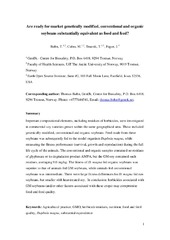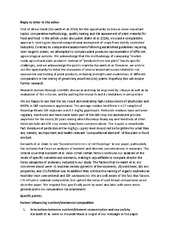Blar i forfatter Det helsevitenskapelige fakultet "Cuhra, Marek"
-
Are ready for Market Genetically Modified, Conventional and Organic Soybeans Substantially Equivalent as Food and Feed?
Bøhn, Thomas; Cuhra, Marek; Traavik, Terje; Fagan, John (Chapter; Bokkapittel, 2015)Important compositional elements, including residues of herbicides, were investigated in commercial soy varieties grown within the same geographical area. These included genetically modified, conventional and organic soybeans. Feed made from these soybeans was subsequently fed to the model organism Daphnia magna, while measuring the fitness performance (survival, growth and reproduction) during the ... -
Chronic Responses of Daphnia magna under Dietary Exposure to Leaves of a Transgenic (Event MON810) Bt-Maize Hybrid and its Conventional Near-Isoline
Holderbaum, Daniel Ferreira; Cuhra, Marek; Wickson, Fern; Orth, Afonso Inácio; Nodari, Rubens Onofre; Bøhn, Thomas (Journal article; Tidsskriftartikkel; Peer reviewed, 2015-08-11)Insect resistance is the second most common trait globally in cultivated genetically modified (GM) plants. Resistance is usually obtained by introducing into the plant’s genome genes from the bacterium Bacillus thuringiensis (Bt) coding for insecticidal proteins (Cry proteins or toxins) that target insect pests. The aim of this study was to examine the hypothesis that a chronic, high-dose dietary ... -
Clone- and age-dependent toxicity of a glyphosate commercial formulation and its active ingredient in Daphnia magna.
Cuhra, Marek; Traavik, Terje; Bøhn, Thomas (Journal article; Tidsskriftartikkel; Peer reviewed, 2013)Low levels of glyphosate based herbicide induced significant negative effects on the aquatic invertebrate Daphnia magna. Glyphosate herbicides such as brands of Roundup, are known to be toxic to daphnids. However, published findings on acute toxicity show significant discrepancies and variation across several orders of magnitude. To test the acute effects of both glyphosate and a commercial ... -
Compositional differences in soybeans on the market: glyphosate accumulates in Roundup Ready GM soybeans
Bøhn, Thomas; Cuhra, Marek; Traavik, Terje; Sanden, Monica; Primicerio, Raul (Journal article; Tidsskriftartikkel; Peer reviewed, 2014)This article describes the nutrient and elemental composition, including residues of herbicides and pesticides, of 31 soybean batches from Iowa, USA. The soy samples were grouped into three different categories: (i) genetically modified, glyphosate-tolerant soy (GM-soy); (ii) unmodified soy cultivated using a conventional ‘‘chemical’’ cultivation regime; and (iii) unmodified soy cultivated using an ... -
Ecotoxicological assessment of Roundup-ready soybean agriculture investigated in a D. magna model
Cuhra, Marek (Doctoral thesis; Doktorgradsavhandling, 2015-06-09)Transgenic glyphosate tolerant soybeans are constituents of an industrial production system with specific agricultural practices and supplementary agrochemicals as interwoven additional elements. Thus the material produced should not be seen as an isolated product of a specific modified genotype but rather as a product of a tailored agriculture system. This globally dominant crop has been in open ... -
Glyphosate non-toxicity: the genesis of a scientific fact
Cuhra, Marek (Journal article; Tidsskriftartikkel; Peer reviewed, 2015-09-30)Repetition of a 1978 experiment on the toxicity of glyphosate chemicals in water-flea Daphnia magna showed surprising results. In the 31 years which had passed between the two series of experiments, the toxicity of glyphosate had apparently become 300 times stronger! Further investigation into this enigmatic paradox discloses unfortunate aspects of laboratory researcher cultures as well as fundamental ... -
Glyphosate-Residues in Roundup-Ready Soybean Impair Daphnia magna Life-Cycle
Cuhra, Marek; Traavik, Terje; Dando, Mickael; Primicerio, Raul; Holderbaum, Daniel Ferreira; Bøhn, Thomas (Journal article; Tidsskriftartikkel; Peer reviewed, 2015-01-30)Herbicide tolerant plants such as Roundup-Ready soybean contain residues of glyphosate herbicide. These residues are considered safe and previous animal-feeding-studies have failed to find negative effects related to such chemical residues. The present study tests 8 experimental soy- meal diets as feed in groups (each containing 20 individuals) of test-animals (D. magna). The diets have different ... -
Glyphosate: too much of a good thing?
Cuhra, Marek; Bøhn, Thomas; Cuhra, Petr (Journal article; Tidsskriftartikkel; Peer reviewed, 2016-04-28)Although previously accepted as the less toxic alternative, with low impact on animals, farmers as well as consumers who are exposed to residues in food, glyphosate chemicals are now increasingly controversial as new evidence from research is emerging. We argue that specific aspects of the history, chemistry and safety of glyphosate and glyphosate-based herbicides should be thoroughly considered ... -
In plastico: laboratory material newness affects growth and reproduction of Daphnia magna reared in 50-ml polypropylene tubes
Cuhra, Marek; Bøhn, Thomas; Cuhra, Petr (Journal article; Tidsskriftartikkel; Peer reviewed, 2017-04-20)Plastic laboratory materials are found to affect vital parameters of the waterflea Daphnia magna. The main responsible factor is defined as “newness” of the materials. Juvenile D. magna were raised individually in; a) new laboratory-standard 50 ml polypropylene tubes, and; b) identical tubes which had been washed and aerated for several weeks. Newness had significant effects on growth and fecundity ... -
Reply to letter to the editor
Bøhn, Thomas; Cuhra, Marek; Traavik, Terje; Sanden, Monica; Fagan, John; Primicerio, Raul (Journal article; Tidsskriftartikkel; Peer reviewed, 2015-04-01) -
Review of GMO safety assessment studies: glyphosate residues in Roundup Ready crops is an ignored issue
Cuhra, Marek (Journal article; Tidsskriftartikkel; Peer reviewed, 2015-09-10)<p><i>Background - </i>Genetically modified glyphosate-tolerant cultivar varieties have been a commercial success widely known as Roundup Ready plants. As new glyphosate-tolerant varieties are introduced to satisfy agriculture demand, it is relevant to review the scientific evidence that documents the quality and safety of such biotechnology. Assessments of genetically modified glyphosate-tolerant ...


 English
English norsk
norsk








